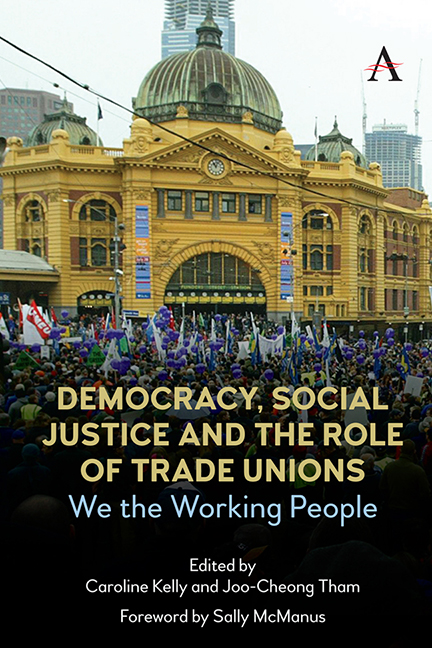Book contents
- Frontmatter
- Contents
- Foreword
- Acknowledgements
- Chapter 1 Democracy and Social Justice as Organising Principles
- Chapter 2 Economic Democracy, Workers and Unions
- Chapter 3 Nobody Owns the Future
- Chapter 4 Regulatory Approaches to the Internal Affairs of Trade Unions in Australia: From Democratic Control to Corporate Accountability
- Chapter 5 Trade Unions and the Regulation of Election Funding: Between Libertarianism and Egalitarianism
- Chapter 6 Trade Unions and Precarious Work: In Search of Effective Strategies
- Chapter 7 ‘Is There an App for That?’ Worker Representation, Unions and the Gig Economy
- Chapter 8 Temporary Migrant Workers and Trade Unions in Australia: A Complex Relationship
- Chapter 9 Unions, Fossil Fuel Exports and a Just Transition
- Chapter 10 Trade Agreements, Labour Rights and Democracy
- Chapter 11 Trade Unions, Labour Law and Democratic Socialism: The COVID-19 Crisis in the United Kingdom
- Notes on Contributors
- Index
Chapter 3 - Nobody Owns the Future
Published online by Cambridge University Press: 18 November 2021
- Frontmatter
- Contents
- Foreword
- Acknowledgements
- Chapter 1 Democracy and Social Justice as Organising Principles
- Chapter 2 Economic Democracy, Workers and Unions
- Chapter 3 Nobody Owns the Future
- Chapter 4 Regulatory Approaches to the Internal Affairs of Trade Unions in Australia: From Democratic Control to Corporate Accountability
- Chapter 5 Trade Unions and the Regulation of Election Funding: Between Libertarianism and Egalitarianism
- Chapter 6 Trade Unions and Precarious Work: In Search of Effective Strategies
- Chapter 7 ‘Is There an App for That?’ Worker Representation, Unions and the Gig Economy
- Chapter 8 Temporary Migrant Workers and Trade Unions in Australia: A Complex Relationship
- Chapter 9 Unions, Fossil Fuel Exports and a Just Transition
- Chapter 10 Trade Agreements, Labour Rights and Democracy
- Chapter 11 Trade Unions, Labour Law and Democratic Socialism: The COVID-19 Crisis in the United Kingdom
- Notes on Contributors
- Index
Summary
Reviving the Impulse to Economic Democracy
The subject of this chapter is economic democracy. It is an old topic, and one that has generated a rich history of fertile thought and mostly frustrated action.
The impetus to economic democracy stems, in part, from a simple intuition: under capitalism, economic life tends to be autocratic, and, yet, we condemn autocracy and praise democracy; therefore, for the sake of consistency, we ought to demand the transformation of the economy along more democratic lines; this is the basic impulse that animates economic democracy. As the nineteenth century writer Henry Demarest Lloyd put it, ‘there is to be a people in industry, as in government’. That demand has always represented an important moral challenge to orthodox beliefs about our society. Defenders of the orthodoxy have never convincingly seen off the challenge, at least not at the level of principle. As a matter of political practice, however, economic democracy has been a marginal phenomenon.
In this chapter, I want to suggest that the impulse to economic democracy is in urgent need of revival and that trade unionists ought to contribute to its resurgence: see also, Chapter 2 by David Peetz in this volume. I refer to the ‘impulse’ to economic democracy because I want to focus on its underlying moral impetus and its general implications. So, I will not consider any particular institutional forms or structures that have been, or might be, imagined for it. Developing an institutional blueprint for economic democracy is not the most urgent thing.
What is needed right now, I will argue, is something more basic – namely, a concerted effort to challenge concentrated, private economic power, and to do so in a way that gives voice to the democratic spirit. We need to begin to encroach upon plutocracy – economic autocracy – in the name of democracy. The initial aim would be simple, yet nonetheless fairly ambitious: to persuade people that democratic principles are relevant to the basic organisation and running of economic life, and not only at the level of the particular firm or industry – which is the traditional terrain of ‘industrial democracy’ – but in relation to the economy as a whole.
- Type
- Chapter
- Information
- Democracy, Social Justice and the Role of Trade UnionsWe the Working People, pp. 27 - 48Publisher: Anthem PressPrint publication year: 2021



